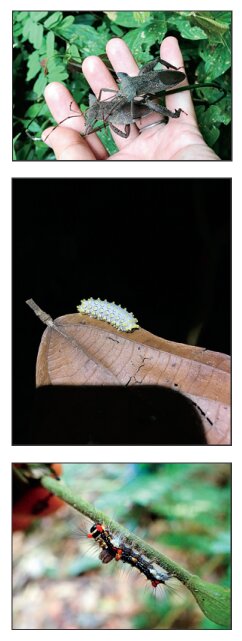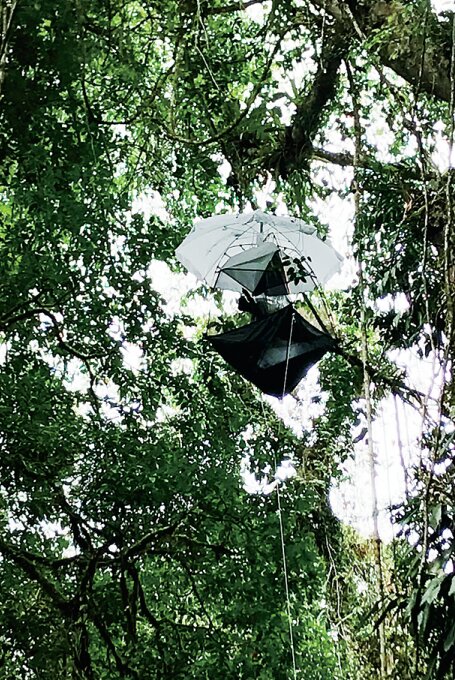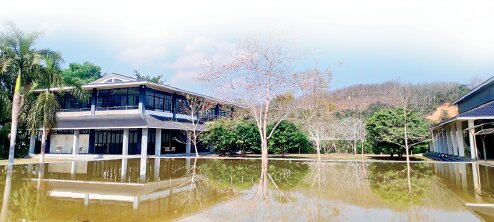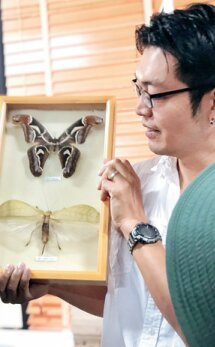|
|
|
| High life: A Japanese ecologist climbs trees in Yunnan to better understand the forest canopy |
| ArticleSource: |
China Daily |
 |
Text Size: A A A |
|

(from top) An insect classified as a true bug (Coreoidea); a burnet moth caterpillar which carries cyanide poison; tussock moth caterpillar commonly found in Xishuangbanna rainforest. CHINA DAILY A Japanese ecologist climbs trees in Yunnan to better understand the forest canopy, Yang Feiyue reports.
With simple tools, Akihiro Nakamura can quickly climb to the top of a tree that is more than 30 meters from the ground.
The Japanese ecologist knows his way around the forest in Xishuangbanna Dai autonomous prefecture, Southwest China's Yunnan province. But it's only half of the battle to get to the top.
"I normally stay up there for about half an hour, observing insects and collecting leaves to see how many leaves are eaten by insects," Nakamura, 44, says.
It's part of his research into the forest canopy, which refers to the upper vegetation in an area, generally formed by tree crowns. Different from the forest ground that is dark and humid, the canopies are more open and exposed to sunlight.
"It makes the canopies hot spots of biological diversity, engines of global biochemical processes, and the dynamic interface between organic nature and the atmosphere," Nakamura says.
"It plays an essential role in helping us obtain a clear picture of biodiversity and the functioning of forest ecosystems."
The forest has become a home away from home for him. Although Nakamura's focus has been on insect diversity on the canopies, he also stops to check insects on the ground wherever he goes.
"It makes our research both horizontal and vertical," he says.
In 2013, Nakamura accepted an invitation from Xishuangbanna Tropical Botanical Garden after he finished his postdoctoral studies in ecology at Griffith University in Australia, where he also made Chinese friends.
He then learned about the botanical garden, which is home to some 13,000 tropical plant species. It boasts one of the most diverse collections of outdoor plants in the world, which makes it an ideal place for Nakamura's research. "So I decided to join." 
Over the years, Nakamura has looked into the forest microclimate, species biodiversity and interactions, and biogeochemical processes in Yunnan.
"I'm happy to conduct field investigations here, and explore the forest canopy with the aid of new technologies, especially the canopy crane," he says, adding that the botanical garden has offered him the infrastructure for his experiments.
The crane is used in forested areas to gain access to the canopy stratum, and there are fewer than 20 of them worldwide, while China has half of the total number, Nakamura says.
"The crane is crucial for canopy studies and allows us to conduct research in a safer and easier manner. You can carry a lot of equipment up there.
"But their numbers are limited, and only certain areas can be covered, so climbing trees is necessary in some cases," he says.
Since he was 7, he has been thinking about the environment.
"I lived in a peri-urban area (where suburbs meet the countryside), where I collected insects and caught fish in the paddy fields in my childhood," he says.
"Then, I started to see lots of housing development, which took up the crop fields where I used to play. That was sad."
Back then, Nakamura didn't find many universities in Japan that offered environmental studies as a degree. After consulting with his Australian friends in Japan, he went to Australia to pursue environmental sciences in 1997.
Years of study have turned Nakamura's attention to insects, especially on forest canopies. Insects are indispensable and play an important role in predicting climate change, Nakamura explains.
"Without them, we can't survive," he says, adding that they are "ecosystem service providers" and contribute to pollination, nutrient-cycling and pest control.
"Even termites help clean the fallen leaves and trees," he says, adding that people may think of these insects as nuisance, but they are actually providing essential services for our survival and well-being.
Nakamura has been studying the impact of artificial lights on insects and plants.

Xishuangbanna Tropical Botanical Garden, one of the largest tropical botanical gardens in the world. CHINA DAILY "We found that the impact of light pollution on insects is more evident in disturbed secondary forests and plantations compared with primary forests, whereas we may need more time to measure the impact on plants," he says.
He has also begun international research projects with other scientists, including those in the Czech Republic, Thailand, Brazil and Europe, to learn how insect diversity changes with latitude and elevation and assess the impact of climate change on global insect diversity and ecosystem functions.
"Climate change is of a global scale, and everything has to be dealt with at a global scale to understand what's happening," Nakamura says. "We need to collect information about insects from all over the world. International cooperation is beneficial to biodiversity conservation."
In 2019, Nakamura won the Caiyun Award, Yunnan's highest honor for foreign experts, for his contribution to biodiversity conservation in China.
"I have seen how China has progressed in biodiversity conservation," Nakamura says, adding that the government is willing to listen to the advice of scientists and has formulated measures to safeguard biodiversity.
Last year, a herd of wild elephants that had wandered away from their traditional habitat in Yunnan was helped by forest officials to return home with minimal intervention and no severe human-animal conflict during the process.
"It was a perfect example of China's scientific biodiversity conservation and management," he says.
Nakamura noticed the swift implementation of the country's ban on wildlife trading after the COVID-19 pandemic.
"They were all gone from local markets," he says.
He also observed that the Yunnan provincial government has been trying to restore the forest by replacing rubber plantations with native trees.
"I think it's amazing to see that the government looks at not only the balance sheet but also the wellbeing of the people and other organisms living together," he says.
Thilina Sudarshana Nimalrathna has been following Nakamura in doctoral ecology studies since 2018.
"I got to know him during a training in 2017 and he was the instructor," says the Sri Lankan researcher.

Akihiro Nakamura shows insects to school children. CHINA DAILY Nimalrathna found that Xishuangbanna Tropical Botanical Garden offered the subjects in which he was interested and decided to pursue a doctoral program in Yunnan. During years of work with Nakamura, Nimalrathna received help in improving and materializing his plans.
"He exposed me to thinking outside the box and used his expertise to help me carry out my ideas," Nimalrathna, 30, says.
It will take Nimalrathna another three years to finish his doctoral program, but he says he will continue with his postdoctoral studies in ecology there.
Nakamura says China has made significant progress in protecting biodiversity.
"Biodiversity is essential to human health and well-being. I hope countries can strike the right balance between economic development and biodiversity protection and set practical goals to minimize habitat degradation and biodiversity loss."
Nakamura says he will continue to live in China.
"We have a lot to do, a lot of international projects are coming up, one of which will go on for four years," he says, adding that at the Xishuangbanna botanical garden, foreign researchers can also get funding from the National Natural Science Foundation of China and the Chinese Academy of Sciences.
Nakamura says he plays Frisbee three times a week and goes to the gym whenever he can to keep up the stamina required to climb trees.
"I'm still learning other climbing techniques, such as moving from one tree to another, how to hoist heavy stuff and how to rescue people stuck in a canopy," he says. Li Yingqing contributed to the story.
Contact the writer at yangfeiyue@chinadaily.com.cn URL: https://global.chinadaily.com.cn/a/202203/28/WS6240ffa8a310fd2b29e5390d_1.html |
|




